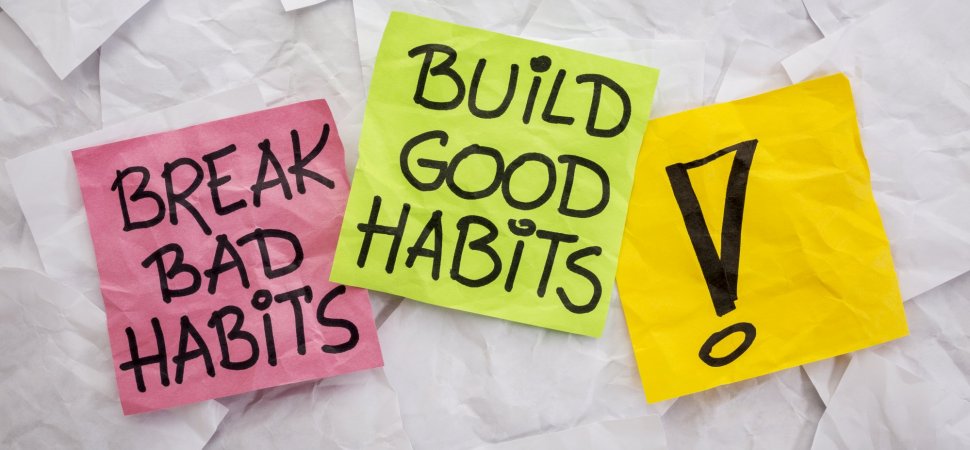The fastest way to achieve your dreams is to commit to them. Once you are committed to something, nothing else will stand in your way… unless you have bad habits. Yet, if the commitment is strong enough, you will break those habits.
Nothing drives performance like good habits. We all know that high performers have great habits. But how do we develop and keep them?
Your habits are yours. Your inner peace and joy often come from the habits you have.
You control your habits. Success and joy come from focusing on what you can control. Whenever you focus on situations or people outside of your control, you lose even more control, you enter a state of deception and despair.
Good habits create a positive mindset. When you focus on behaviors that you can control, you can develop plans and take action. The hope of being able to solve a problem is often enough to change your mood which in turn changes the outcome.
Developing and keeping good habits is about the process over the result.
Yes, of course, we want results. In the end, results do matter. Yet, to get the best results, don’t focus on the end goal, only focus on what it takes for you to get there and master those steps.
Here are six processes that when implemented, will ensure good habits:
1. Develop clarity.
The Oprah-approved high-performance trainer Brendon Burchard teaches that:
“You have to know who you are, what you value, what your strengths and weaknesses are, and where you want to go. This kind of knowledge makes you feel better about yourself and about life.”
In other words, know and decide what you want. Get clear on who you are and what you want to become by writing it down.
When you have clear intentions and focused purpose, your “why” becomes your main motivator. No action or sacrifice is too much for that goal.
Review your purpose weekly. Review your actions daily.
2. Start small.
Aristotle once wrote, “We are what we repeatedly do. Excellence then, is not an act, but a habit.”
He was right. Doing something over and over makes it easy. If you want to sell better, start by creating conversations. Don’t focus on the sale itself–focus on the habit of picking up the phone and talking to people.
Every big habit is supported by many smaller habits. Find the small habit and develop that first. It’s easy to do many little things over and over again.
3. Focus on routine.
Eventually, you’ll be able to do those things on autopilot. Make your desired habit part of your daily routine. Write it down. Check it off your list.
If you want better clients, find out what you need to do to get them and then create habits that revolve around those specific actions. Calendar it into your daily schedule.
Any goal is possible. Just commit to it and pencil it in. As best-selling author Charles Duhigg says: “The key to victory is creating the right routines.”
4. Reward desired behavior.
Bad habits get rewarded, if they didn’t, you wouldn’t have them.
Harvey Mackey, the best selling leadership and sales author teaches: “Good habits are as addictive as bad habits, and a lot more rewarding.” That, of course, is easier said than done–but you can do it.
Don’t change the reward–just change how it’s applied. Find rewards that have meaning to you and then use them to connect good behavior to desired outcomes.
5. Journal your progress.
Celebrate wins. Contemplate mistakes. Create plans to magnify the win column and strategies to minimize the mistakes.
As the late Jim Rohn once said, “A life worth living is a life worth recording.”
Without proper reflection, the habits do not have any meaning. By applying your own personal meaning, you can accelerate your progress.
6. Find your super-supporter.
You need to spend time around the people who will help you keep your habits. Don’t take it from me–take it from Oprah Winfrey, who once said, “Surround yourself with only people who are going to lift you higher.”
Find the most positive person you know and ask them to hold you accountable.
They will make sure you are on track and do it in a positive way. This type of supporter is needed to help you know that you are staying consistent with your values and that your actions align with your “why.”
Habits help you do things consistently, without thinking about the entire process all the time. Habits can make or break you. The good thing is, habits can be changed.
The choices you make today, form your habits of tomorrow. If you believe in your ability to adjust and change, you can develop habits that will enable you to maximize your potential.
Ready to upgrade? Want better relationships? Get this free guide now!
I’ve created a quick guide for mastering professional relationships, immediately. If you follow this one MAIN truth and actionable steps found inside, your whole life will improve, quickly.
Also, connect with me!
Originally published at www.inc.com


